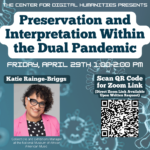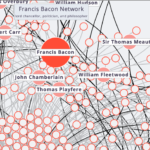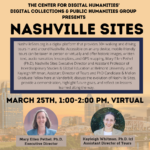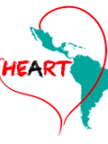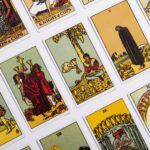Author
Preservation and Interpretation Within the Dual Pandemic
Apr. 21, 2022—Preservation and Interpretation Within the Dual Pandemic by Katie Rainge-Briggs Collections and Exhibitions Manager at the National Museum of African American Music
DH Newsletter for April 20
Apr. 20, 2022—In This Newsletter Digital Humanities Events Celebrations CFPs, Conferences, and Workshops DH Scholarship News Digital Humanities Events Below is a selection of upcoming events across campus that might be of interest to scholars, educators, and students working in and around Digital Humanities. You can always check out events that the Center for Digital Humanities...
Digital Humanities and Pre-Modern Studies: A Review
Apr. 14, 2022—By Samantha Rogers, Department of History and Mellon Graduate Student Fellow Digital humanities are a dynamic and evolving field that, in my mind, serves two crucial functions. First, they offer methods of data gathering, analysis, and visualization that enable scholars to engage with new research questions and present their work in new ways. Second,...
Nashville Sites: A Conversation
Mar. 21, 2022— Join us on Friday, March 25th at 1:00 PM central for Nashville Sites: A conversation. Speakers Mary Ellen Pethel, Nashville Sites Executive Director, and Kayleigh Whitman, Assistant Director of Tours, discuss the evolution of Nashville Sites, provide a demonstration, highlight future goals, and reflect on lessons learned along the way. NashvilleSites.org is a digital...
Telling Latinx’s Stories through Digital Humanities and Community-Engaged Projects
Mar. 15, 2022—Elvira Aballi Morell – Department of Spanish and Portuguese & Mellon Graduate Fellow The Latinx community in the U.S. has been growing exponentially, and with it, the community’s needs. It is known that “Latinos accounted for half of the growth in the U.S. between 2000 and 2012” (Tennessean). However, most people may not know that...
The World Language vs Programming Language Debate: An Opinion
Mar. 14, 2022—Tyler Anthony – Department of Spanish and Portuguese, CMAP, Mellon Graduate Fellow In recent years, a debate surrounding world language credit has emerged within different educational institutions across the United States. Traditionally, students across the nation are required to meet a certain credit threshold of world language courses, such as Spanish, French, Mandarin, etc. to...
The Changing Spaces of Dating Apps since COVID-19
Mar. 2, 2022—By Abigail Trozenski, German, Russian & East European Studies & CMAP With the annual celebration of Valentine’s Day recently passed, let us examine modern celebrations of romance forming in the world of online dating services. Turning to digital media for all things love has been on the rise since the early 2000s, and we’re...
On Sentiment Analysis and Transformative Methods in Digital Humanities
Feb. 21, 2022—By Debbie Brubaker, Mellon Graduate Fellow, Religion/Theological Studies When digital technologies are integrated into humanistic research projects, the search for alignment between research tools and objectives often challenges commonly-used approaches. This has been my experience during data collection, corpus creation, and through the selection of technical tools as a Mellon Graduate Fellow in DH. Most...
The potential of 3D models and virtual reality of architecture to position users “in the wake”[1] of slavery and colonialism
Feb. 9, 2022—By Katerina Traut, Mellon Graduate Fellow, Political Science Architecture, place, and space are powerful tools for humanistic teaching and scholarship. In the past two decades, research that uses technology such as Geographic Information Systems (GIS) and StoryMap JS to visualize, represent, and analyze spatial data has boomed. Spatial humanities that uses digital tools spurs questions...
The Game of Tarot Amid Fact and Fiction: Using Digital Maps to Trace Cultural Histories
Nov. 22, 2021—by Meghan McGinley, Mellon Graduate Fellow, French & Italian I initially conceived of my DH project “Mapping the Tarot: Game and Divination Across Time” as a means to trace the cultural histories of the game of tarot using ArcGIS, an online mapping tool that allows for interactive digital storytelling. In conjunction with the George Clulow-United...

